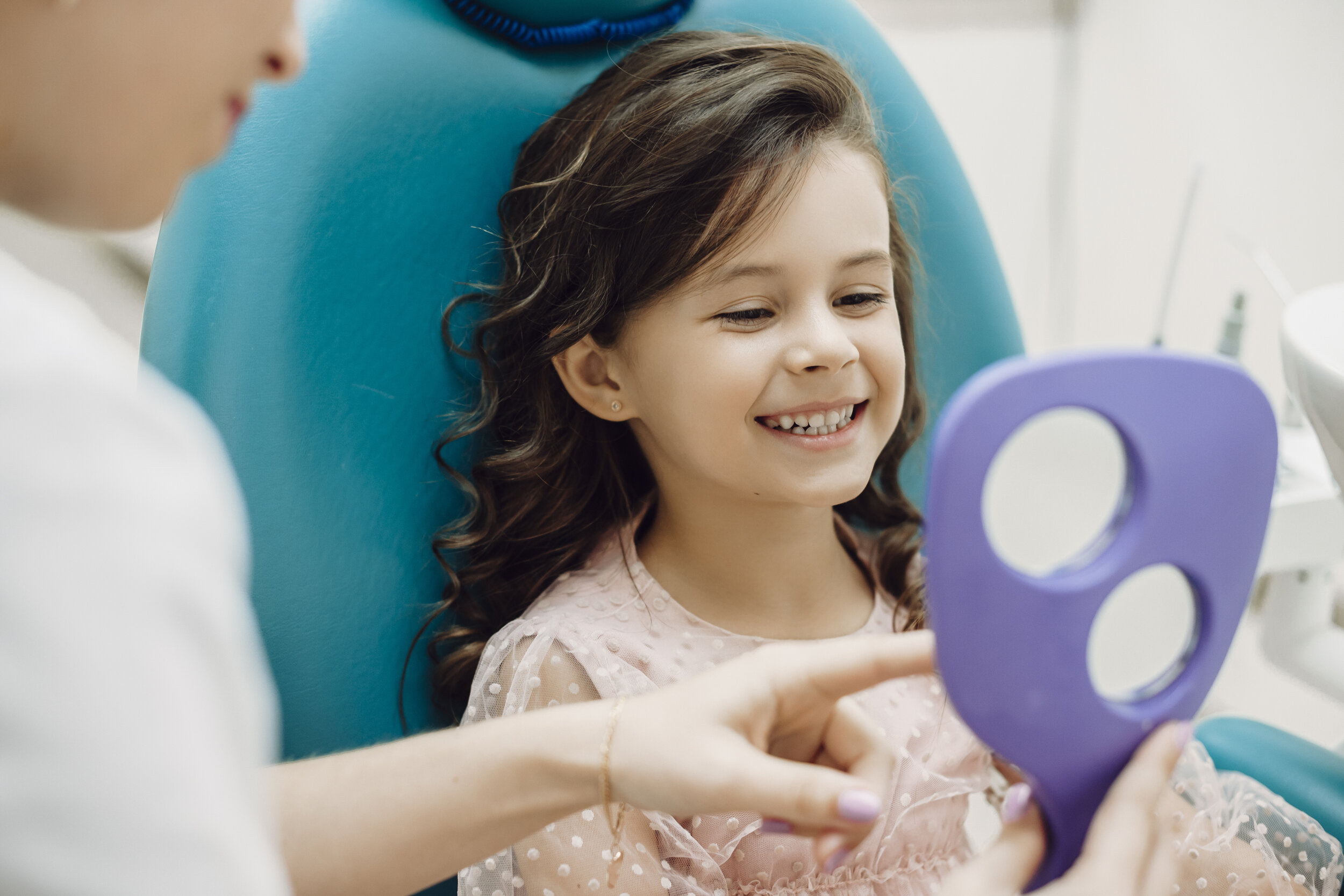
Treatments
Children’s Dentistry
If you are looking for a children’s dentist in Leeds, then look no further!
Our dental practice has a large team of experienced Specialist Paediatric Dentists!
We receive hundreds of referrals every month from dentists in and around West Yorkshire, including the Dental Institute, and have two dedicated children’s treatment suites that offer inhalation sedation. We also have two fish tanks in the practice which the children can enjoy!
The benefits
We believe in Preventative dentistry and encourage children to visit the dentist from an early age. Regular check-ups from a young age will ensure children won’t suffer from untreated dental decay or damage to their adult teeth.
Studies show that the earlier you bring your child to the dentist, the more likely they are to have a positive experience and grow up not being afraid of the dentist.
Early and regular visits also allow the dentist to spot orthodontic problems such as cross bites, which can be treated by the clinician or, if required, referred to our specialist orthodontists as appropriate.

More about Children’s Dentistry
Healthy diet
It’s important that your child receives a balanced diet that will aid healthy growth and development! A balanced diet should include fruits, vegetables, cereals, legumes, milk and dairy products as well as proteins from meat, fish or eggs! Furthermore, it’s vital to limit a child’s intake of carbohydrates and starch between meals in order to prevent tooth decay.
Their first visit to the dentist
The first routine visit to the dentist will be aimed at establishing a bond between the child and his/her dentist and dental nurse. This trust-based relationship will put the child at ease in subsequent visits – as they’ll quickly see the caring and friendly nature of our wonderful staff! During this first visit, eating and brushing habits of the child are established to identify any tooth decay risks. The parent’s presence in the room can be helpful as parents will be able to ensure their child keeps good oral hygiene and they can help control their diet. However, it may be better for a child to be in the surgery on their own, as sometimes it can make them more attentive to the dentists’ instructions.
Children’s Dentistry
Key facts to remember
Eruption of the first teeth
At about 6 months, the two lower front teeth (central incisors) will erupt, followed shortly by the two upper central incisors. The remainder of the baby teeth appear during the next 18 to 24 months but not necessarily in an orderly sequence from front to back. Incidentally, at 2 to 3 years all of these 20 primary teeth should be present.
Brushing habits
A toothbrush is the basic tool that your child will use for the rest of his/her life! Choose a soft bristled small headed toothbrush in conjunction with children’s toothpaste. Get them into the habit of brushing at least twice a day. Fluoride containing toothpastes should be used by the time your child is around 3 years of age. Before that, you can use a toothbrush with warm water. Constant supervision of children as they clean their teeth is needed to make sure they don't use too much toothpaste, and to ensure that they spit out any excess toothpaste.
Mouth guards can be crucial
If your child plays sports, a mouth guard should be a top priority on your child’s list of sports equipment. Mouth guards are made of soft plastic and fit comfortably to the shape of the upper teeth. They protect a child’s teeth, lips, cheeks and gums from sports-related injuries. Any mouth guard works better than no mouth guard, but a custom-fitted mouth guard fitted by your dentist, is your child’s best protection against sports-related injuries.
Preventing tooth decay
Make sure that your children are not nursed to sleep. Your child’s bedtime should include nothing other than water, in order to prevent tooth decay. It’s also vital that you teach your child the correct way of brushing and flossing and ensure that they do it regularly. Furthermore, it may be difficult at first, but limiting the amount of juice your child drinks is imperative! Unless it’s freshly squeezed fruit, juice often contains lots of sugar, and it’s best to avoid it if you wish to prevent tooth decay.
FAQ’s
Children will soon lose their milk teeth, why is it important to keep children's oral health immaculate?
What our children learn as they grow up will dictate how they live for the rest of their lives. Teaching children to keep good oral health by teaching them to floss and brush correctly, whilst encouraging visits to the dentist will definitely pave their way to establishing excellent oral hygiene. Moreover, keeping healthy milk teeth, or baby teeth, will allow your children to talk and chew normally and pave the way for the permanent teeth to develop and emerge in a normal and healthy fashion.
When should a child first visit the dentist?
A child’s first visit to the dentist should be when they get their first tooth and should be no later than 1 year after their birth. This exposure to the dental setting will prepare your child for future routine visits so that they become normal and expected.
Will dental X-rays cause any harm to my child?
Due to modern advancements, X-rays these days are at least 90% weaker than they needed to be a few years ago, because of the improvement and development of computer sensors. Dental X-rays are weak and carry a very minute risk to a child's health. Moreover, we are always careful at Clarendon Dental Spa about the amount of radiation a child gets, and we endeavour to limit the use of X-rays until it is needed. We do this to ensure you receive a premium dental care experience.
When should the regular visits to the dental hygienist start?
As a part of general dentistry, we advise that your child starts seeing a dental hygienist every 6 months from the age of 6. This gets them into the habit of seeing the hygienist regularly.
In the event of a toothache, what should I do?
If your child suffers from a toothache, the first thing you should do is try to ease the ache till you see a dentist. You can ease the pain by rinsing the affected area using warm water and putting a cold press on the face if it's swollen. Children’s paracetamol liquid will also help in getting the pain under control. Make sure you contact your dentist to see them as soon as possible.
What if my child loses a permanent tooth?
The first thing you should do is to calmly hold the knocked out tooth by the crown and try to reinsert it in the socket before you see the dentist. If you can't do that, then put the tooth in a glass of milk and take the child and the tooth to the dentist.
How can I help my child through the teething stage?
Sore gums when teeth erupt are part of the normal eruption process. The discomfort is eased for some children by use of a teething biscuit, a piece of toast or a frozen teething ring. Your pharmacy should also have medications that can be rubbed on the gums to reduce the discomfort.
If my child gets a cavity in a baby tooth, should it still be filled?
Primary teeth are important for many reasons. Not only do they help children speak clearly and chew naturally, they also aid in forming a path that permanent teeth can follow when they are ready to erupt. If they are lost early this can cause orthodontic problems.
What causes tooth decay?
Dental plaque is a thin, sticky, colourless deposit of bacteria that constantly forms on everyone’s teeth. When you eat, the sugars in your food cause the bacteria in plaque to produce acids that attack the tooth enamel. With time and repeated acid attacks, the enamel breaks down and a cavity forms.
Start your journey with Clarendons
For all other private treatments please click here
For Children’s Dentistry treatments please complete the form below.
